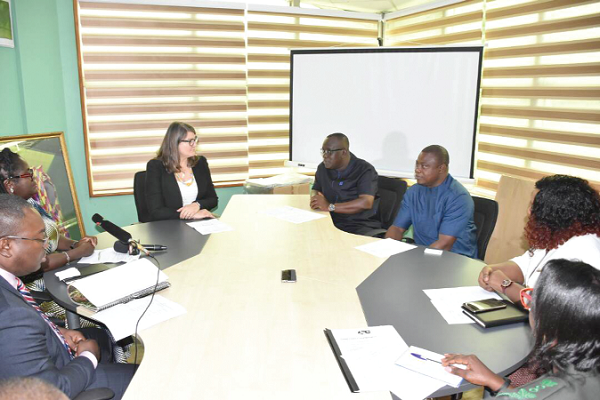The Forestry Commission is to roll out a climate-friendly programme to reduce emissions in cocoa-growing areas in the country.
The $5 million project is being implemented in partnership with a snacks and chocolate company, Mondelez International. It will focus on mapping land use, including cocoa farms, implementation of climate-smart cocoa practices to increase yields and sustainability, as well as improve access to finance to foster good practices by farmers and communities.
Mondelez International is contributing $5 million over five years to the Ghana Cocoa-Forest REDD+ Programme (GCFRP) to significantly reduce the high rate of deforestation and forest degradation, as well as its associated greenhouse carbon emissions from cocoa farming within Ghana’s high forest zone.
Significance
During a courtesy call on the Chief Executive Officer (CEO) of the Forestry Commission yesterday, the International Director of Mondelez, Ms Cathy Pieters, said the company was the world’s biggest chocolate maker, “so understanding the value chain and knowing the people who grow the cocoa for us to be in business is critical for us. We have always been investing in cocoa sustainability”.
“It is a holistic programme so we look at all the different challenges in an integrated way. It also means that cocoa-growing communities are protected and equipped to combat climate change,” she added.
MoU
On January 17, 2018, the Forestry Commission, Mondelez, the United Nations Development Programme (UNDP) and the Ghana Cocoa Board (COCOBOD) signed a memorandum of understanding (MoU) to reduce emissions in Ghana’s cocoa supply chain across Ghana.
In that regard, the CEO of the Forestry Commission, Mr Kwadwo Owusu-Afriyie, said the signing of the MoU showed a commitment to reduce emissions across cocoa value chain in the country.
“To ensure sustainable cocoa production, the commission is also encouraging young people in cocoa-growing communities not to abandon cocoa farms even after acquiring classroom education. We have an ageing population that is dying out and if the youth do not take interest in farming, Ghana is doomed,” he stated.
Deforestation
According to the Forestry Commission, Ghana’s cocoa forest landscape had one of the highest deforestation rates in Africa at 3.2 per cent per annum. More than a quarter (27 per cent) of agriculture conversion results from cocoa expansion, making it the single most important commodity driver of deforestation in the area.
In Ghana, the main drivers of emissions include mining, logging, agriculture, wildfire, firewood/charcoal and settlements.
The GCFRP is the first REDD+ initiative in the world to focus on an ecological landscape that is defined by the production of a globally important agricultural commodity—cocoa—which is responsible for significant emissions in the landscape.

